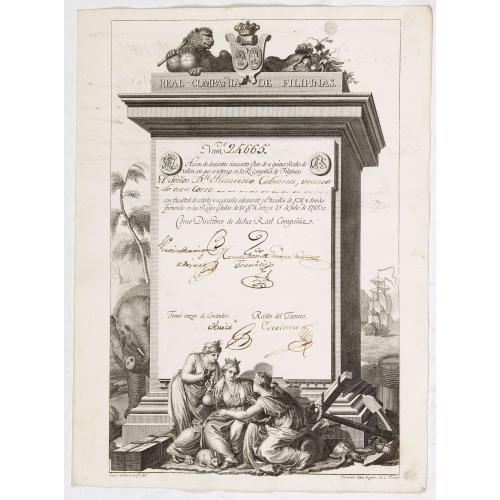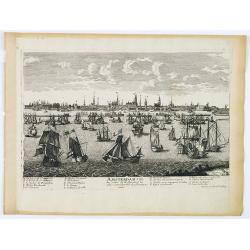Description
A scarce Real Compañia de Filipinas 250 Pesos deed issued in 1785. Share nº 24665, hand signed by several company officials.
Engraved by Fernando Selma (1752-1810) after the drawing by Cosme de Acuña (1758-1814).
On the verso some manuscript entries.
The Real Compañia de Filipinas (Royal Company of the Philippines) was created by royal decree on the 10th of March 1785 to promote the commercial activities of Spain with Asia and America.
Several thousand shares of 250 Pesos were initially issued attracting many investors including apparently the Spanish King Charles III.
On March 10, 1785, Real Compañía de Filipinas (The Royal Company) was established through a royal decree. The company together with Sociedad Económica de Amigos del Pais (Economic Societies of Friends of the Country) established in 1781, were two of the most important events during the coming of Governor General José de Basco y Vargas which marked a new era in the economic history of the country.
The capital of the Real Compañía de Filipinas was fixed at 8 million pesos divided into 32,000 shares of 250 pesos each, the King bought 4000 shares, and the citizens of Manila were allowed 3000.
The main goal of the company was to establish commercial relations among the different colonies, and also between the colonies and Spain, to supply Manila with the products of Europe, and, in return, to carry to Spain not only the products of the Philippines, but also the merchandise coming from the Oriental countries.
The second important object was the encouragement of Philippine agriculture. Its charter required the company to invest 4% of its net profits in some extractive industries, chiefly agriculture. In order to help the company, all the laws and decrees which prohibited the importation of Oriental cloths into Spain, were repealed, and the products of the Philippines were exempted from all kinds of duties both in Manila and in Spain. Furthermore, the merchants of Manila were allowed to go to the Asiatic ports for trade, and the Chinese who came to Manila were allowed to trade freely without subjecting themselves to any restrictions. However, the old Manila-Acapulco trade was not to be disturbed, for the company could not send ships to Acapulco.
The company encouraged the production of silk, indigo, sugar, cotton, and especially of pepper and other spices. For this purpose it bought lands, established posts in Ilocos, Bataan, Cavite, and Camarines, and offered prizes to persons who succeeded in the production. It also gave stimulus to manufacturing by establishing textile factories.
In spite of the special protection and privileges granted to the company, it declined from year to year.
In 1805 it was rechartered, and given 15 years of new life and the same privileges as before. Its capital was fixed at 12.5 million pesos divided into shares of 250 pesos each, foreigners were allowed to own shares, and the ships were allowed to sail directly from the Asiatic ports without stopping at Manila, and finally the 3-year privilege, allowed to foreigners at the request of the company in 1789, of importing into Manila Asiatic goods, and exporting the products of the country, was made perpetual.
In 1830 the privileges of Real Compañía de Filipinas were revoked, and Manila was left open to foreign commerce and navigation.
Reference: The Nineteenth Century and Economic Development, Philippine Progress Prior to 1898, page 62-67, Austin Craig and Conrado Benitez, Philippine Education Co., Inc., Manila, 1916.
Engraved by Fernando Selma (1752-1810) after the drawing by Cosme de Acuña (1758-1814).
On the verso some manuscript entries.
The Real Compañia de Filipinas (Royal Company of the Philippines) was created by royal decree on the 10th of March 1785 to promote the commercial activities of Spain with Asia and America.
Several thousand shares of 250 Pesos were initially issued attracting many investors including apparently the Spanish King Charles III.
On March 10, 1785, Real Compañía de Filipinas (The Royal Company) was established through a royal decree. The company together with Sociedad Económica de Amigos del Pais (Economic Societies of Friends of the Country) established in 1781, were two of the most important events during the coming of Governor General José de Basco y Vargas which marked a new era in the economic history of the country.
The capital of the Real Compañía de Filipinas was fixed at 8 million pesos divided into 32,000 shares of 250 pesos each, the King bought 4000 shares, and the citizens of Manila were allowed 3000.
The main goal of the company was to establish commercial relations among the different colonies, and also between the colonies and Spain, to supply Manila with the products of Europe, and, in return, to carry to Spain not only the products of the Philippines, but also the merchandise coming from the Oriental countries.
The second important object was the encouragement of Philippine agriculture. Its charter required the company to invest 4% of its net profits in some extractive industries, chiefly agriculture. In order to help the company, all the laws and decrees which prohibited the importation of Oriental cloths into Spain, were repealed, and the products of the Philippines were exempted from all kinds of duties both in Manila and in Spain. Furthermore, the merchants of Manila were allowed to go to the Asiatic ports for trade, and the Chinese who came to Manila were allowed to trade freely without subjecting themselves to any restrictions. However, the old Manila-Acapulco trade was not to be disturbed, for the company could not send ships to Acapulco.
The company encouraged the production of silk, indigo, sugar, cotton, and especially of pepper and other spices. For this purpose it bought lands, established posts in Ilocos, Bataan, Cavite, and Camarines, and offered prizes to persons who succeeded in the production. It also gave stimulus to manufacturing by establishing textile factories.
In spite of the special protection and privileges granted to the company, it declined from year to year.
In 1805 it was rechartered, and given 15 years of new life and the same privileges as before. Its capital was fixed at 12.5 million pesos divided into shares of 250 pesos each, foreigners were allowed to own shares, and the ships were allowed to sail directly from the Asiatic ports without stopping at Manila, and finally the 3-year privilege, allowed to foreigners at the request of the company in 1789, of importing into Manila Asiatic goods, and exporting the products of the country, was made perpetual.
In 1830 the privileges of Real Compañía de Filipinas were revoked, and Manila was left open to foreign commerce and navigation.
Reference: The Nineteenth Century and Economic Development, Philippine Progress Prior to 1898, page 62-67, Austin Craig and Conrado Benitez, Philippine Education Co., Inc., Manila, 1916.
FAQ - Guarantee - Shipping
Buying in the BuyNow Gallery
This item is available for immediate purchase when a "Add to Cart" or "Inquire Now" button is shown.
Items are sold in the EU margin scheme
Payments are accepted in Euros or US Dollars.
Authenticity Guarantee
 We provide professional descriptions, condition report (based on 45 years experience in the map business)
We provide professional descriptions, condition report (based on 45 years experience in the map business)
Paulus Swaen warrants the authenticity of our items and a certificate of authenticity is provided for each acquired lot.
Condition and Coloring
We indicate the condition of each item and use our unnique HiBCoR grading system in which four key items determine a map's value: Historical Importance, Beauty, Condition/Coloring and Rarity.
Color Key
We offer many maps in their original black and white condition. We do not systematically color-up maps to make them more sellable to the general public or buyer.
Copper engraved or wood block maps are always hand colored. Maps were initially colored for aesthetic reasons and to improve readability. Nowadays, it is becoming a challenge to find maps in their original colors and are therefor more valuable.
We use the following color keys in our catalog:
Original colors; mean that the colors have been applied around the time the map was issued.
Original o/l colors; means the map has only the borders colored at the time of publication.
Colored; If the colors are applied recently or at the end of the 20th century.
Read more about coloring of maps [+]
Shipping fee
A flat shipping fee of $ 30 is added to each shipment by DHL within Europe and North America. This covers : International Priority shipping, Packing and Insurance (up to the invoice amount).
Shipments to Asia are $ 40 and rest of the world $50
We charge only one shipping fee when you have been successful on multiple items or when you want to combine gallery and auction purchases.
Read more about invoicing and shipping
FAQ
Please have a look for more information about buying in the BuyNow gallery
Many answers are likely to find in the general help section.
Virtual Collection
![]()
With Virtual Collection you can collect all your favorite items in one place. It is free, and anyone can create his or her Virtual map collection.
Unless you are logged in, the item is only saved for this session. You have to be registed and logged-in if you want to save this item permanently to your Virtual Collection.
Read More[+]
Register here, it is free and you do not need a credit card.
Add this item to
Virtual Collection
or click the following link to see my Virtual Collection.
| Digital Image Download | |
|
Paulus Swaen maintains an archive of most of our high-resolution rare maps, prints, posters and medieval manuscript scans. We make them freely available for download and study. Read more about free image download |
In accordance with the EU Consumer Rights Directive and habitually reside in the European Union you have the right to cancel the contract for the purchase of a lot, without giving any reason.
The cancellation period will expire 14 calendar days from the day after the date on which you or a third party (other than the carrier and indicated by you) acquires, physical possession of the lot. To exercise the right to cancel you must inform Paulus Swaen Inc, of your decision to cancel this contract by a clear statement (e.g. a letter sent by post, or e-mail (amsterdam@swaen.com).
To meet the cancellation deadline, it is sufficient for you to send your communication concerning your exercise of the right to cancel before the cancellation period has expired.

